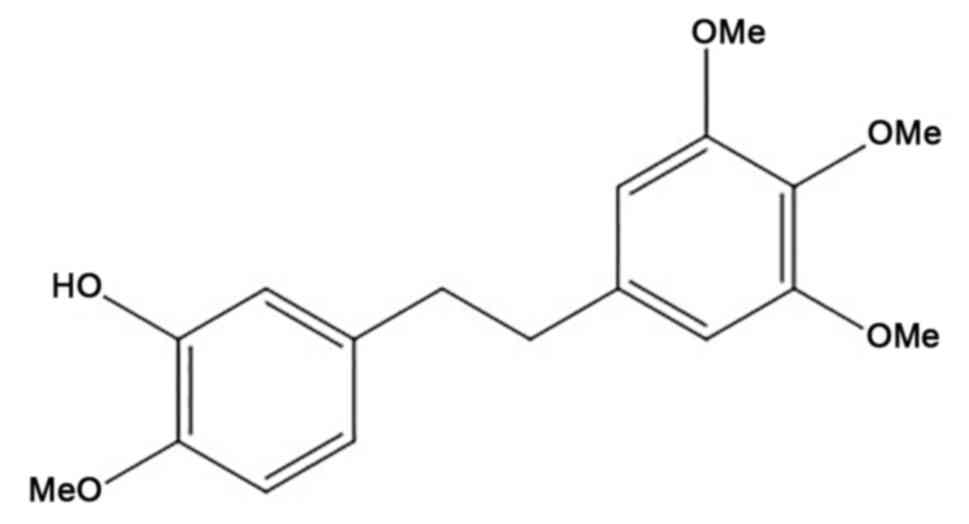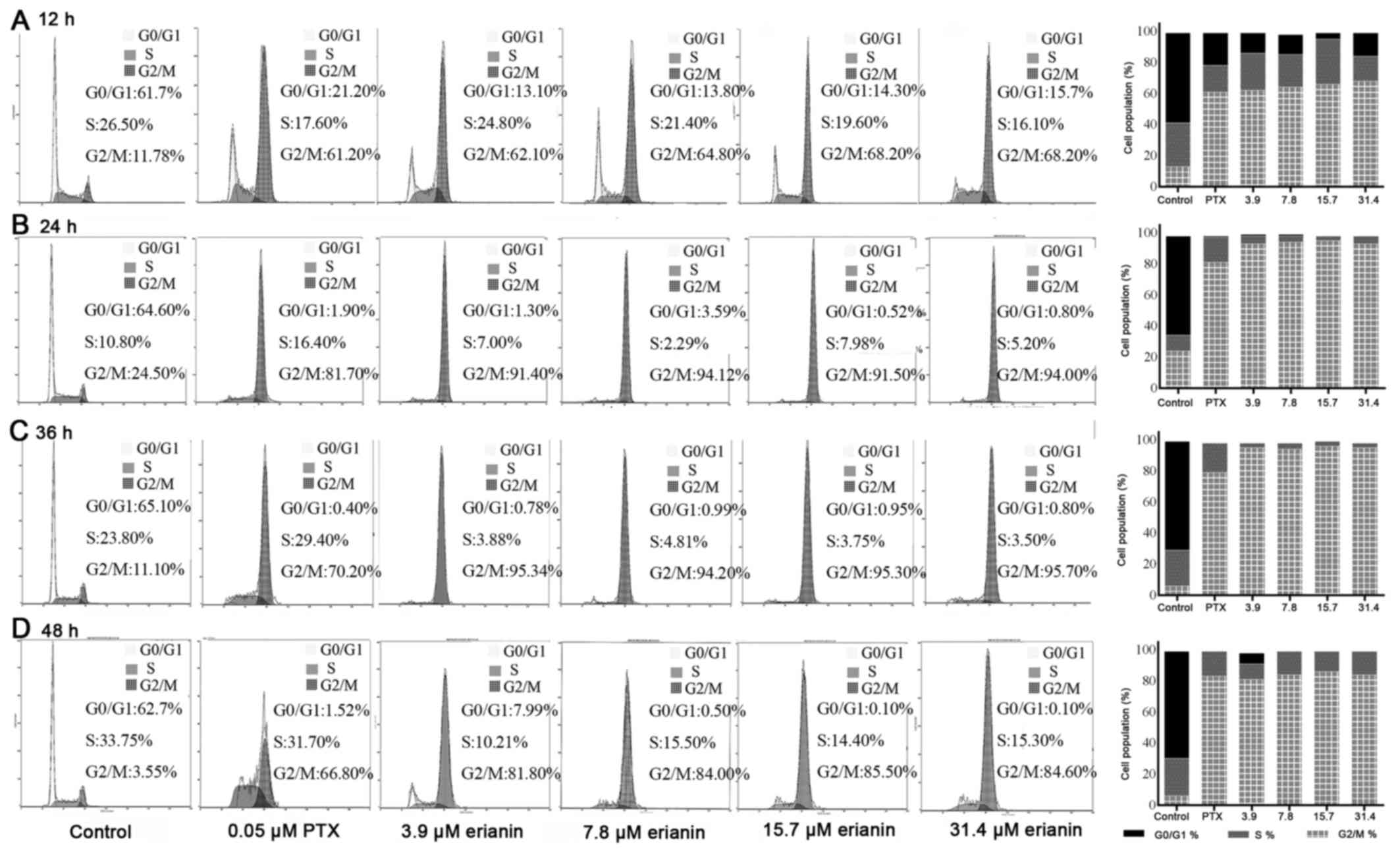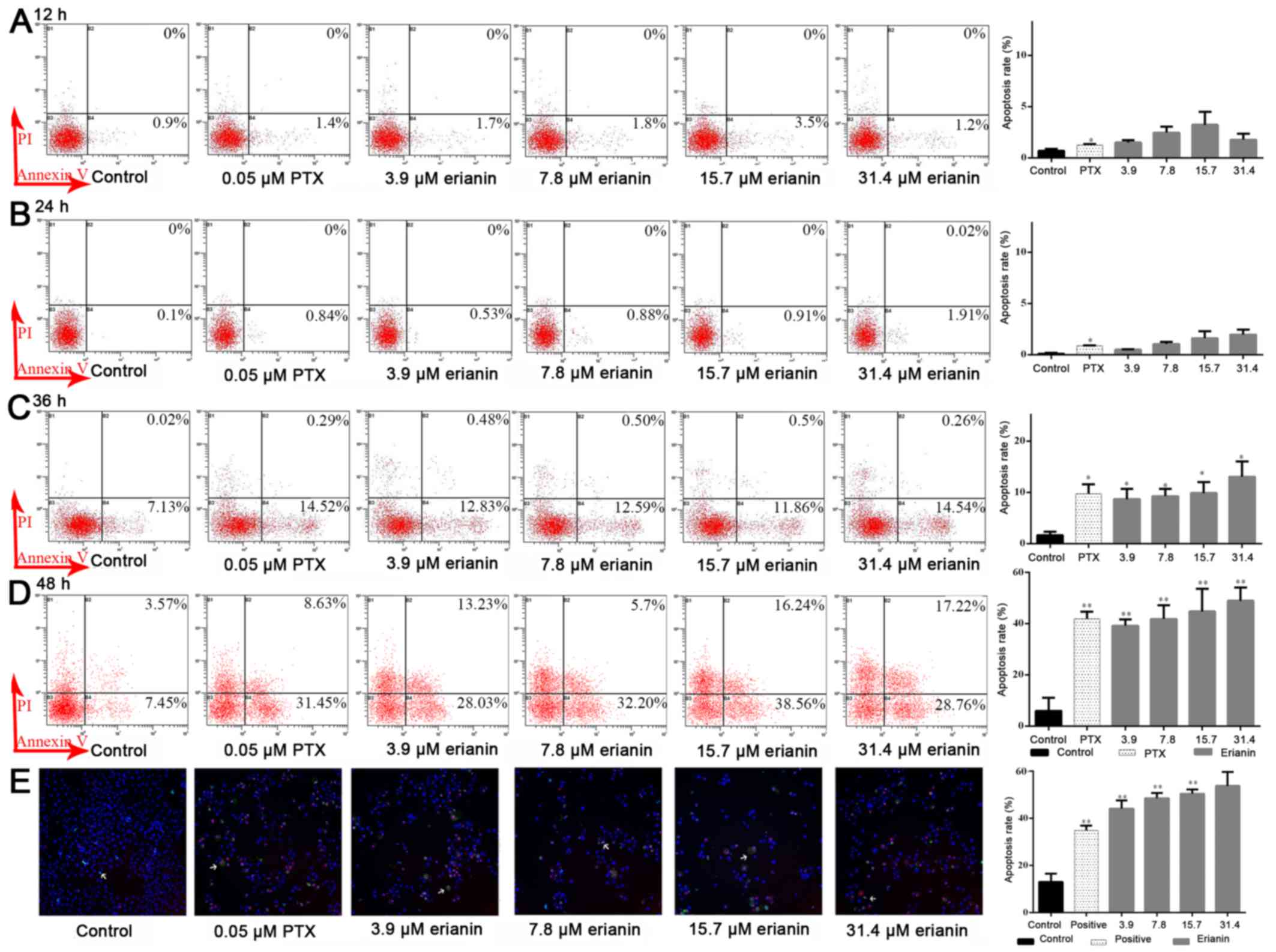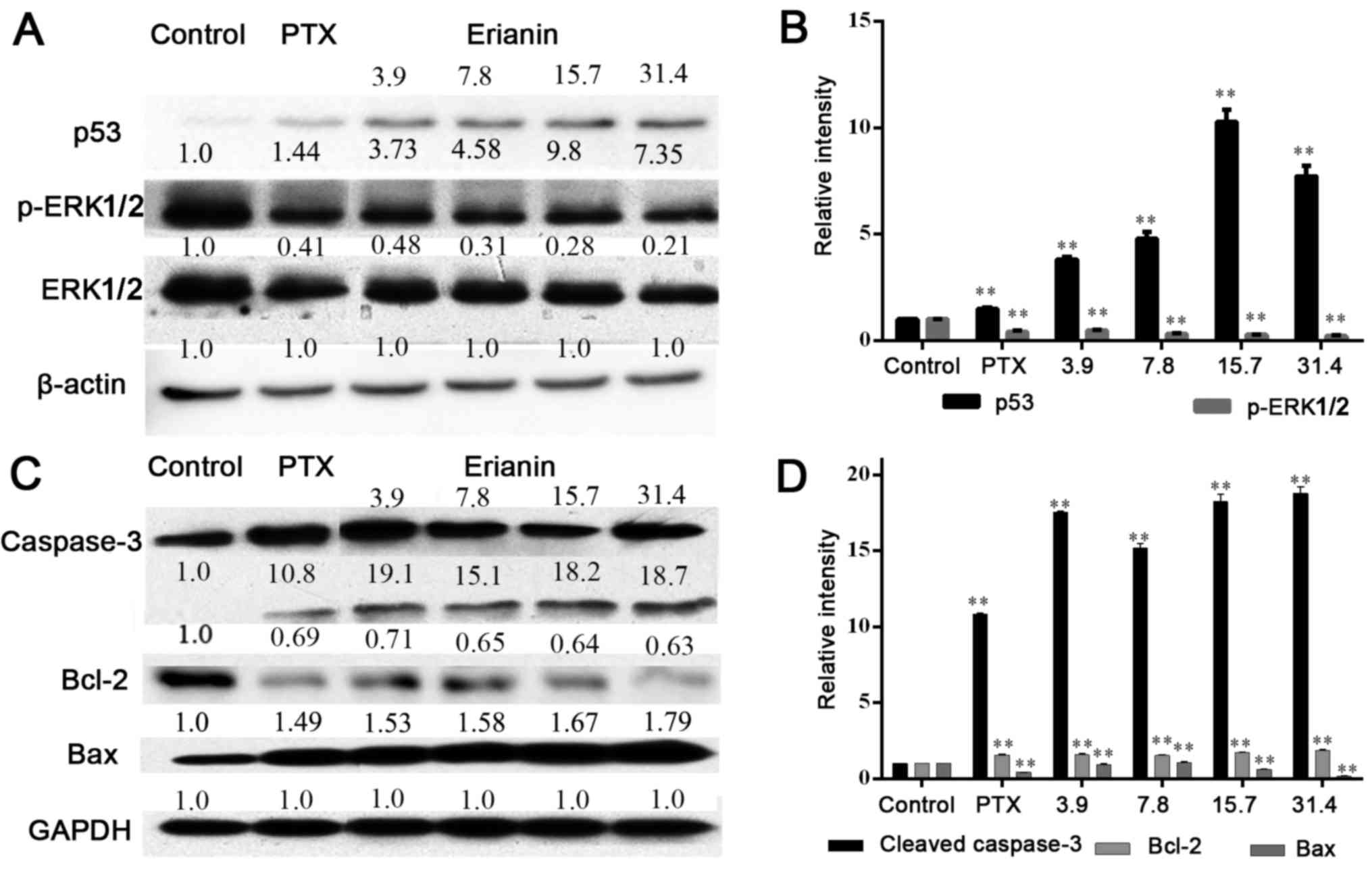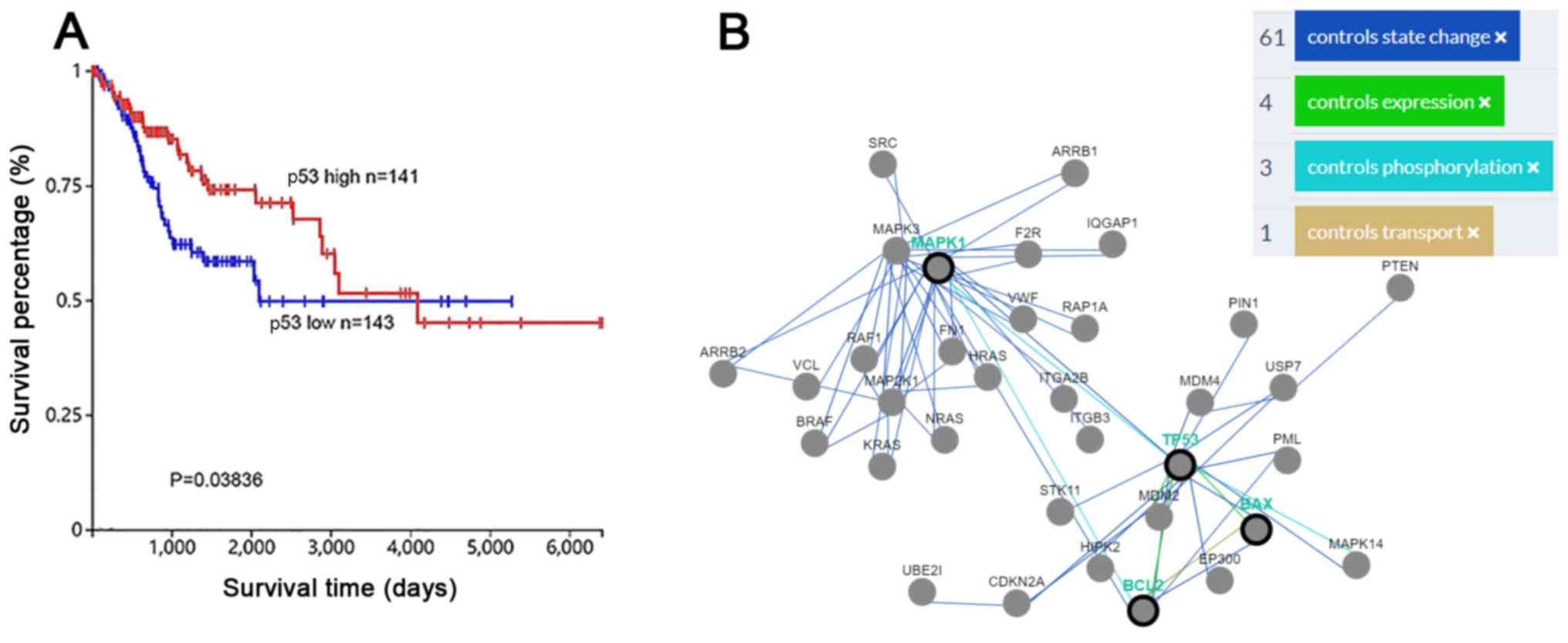|
1
|
Tsikouras P, Zervoudis S, Manav B, Tomara
E, Iatrakis G, Romanidis C, Bothou A and Galazios G: Cervical
cancer: Screening, diagnosis and staging. J BUON. 21:320–325.
2016.PubMed/NCBI
|
|
2
|
Bonneau C, Perrin M, Koskas M, Genin AS
and Rouzier R: Epidemiology and risk factors for cancer of the
uterus. Rev Prat. 64:774–779. 2014.(In French). PubMed/NCBI
|
|
3
|
Castle PE and Maza M: Prophylactic HPV
vaccination: Past, present, and future. Epidemiol Infect.
144:449–468. 2016. View Article : Google Scholar : PubMed/NCBI
|
|
4
|
Tang J and Hao F: The present situation
and the future of vaccines for cervical cancer. Immunol J.
26:546–550. 2010.
|
|
5
|
Chinese Pharmacopoeia Committee, .
Pharmacopoeia of China. Chin Med Sci Technol Press; pp. 1–93.
2015
|
|
6
|
Ng TB, Liu F and Wang ZT: Antioxidative
activity of natural products from plants. Life Sci. 66:709–723.
2000. View Article : Google Scholar : PubMed/NCBI
|
|
7
|
Ma GX, Xu GJ and Xu LS: Inhibitory effects
of Dendrobium chrysotoxum and its constituents on the mouse HePA
and ESC. J Chin Pharm Univ. 25:188–189. 1994.
|
|
8
|
Li YM, Wang HR and Liu GQ: Erianin induces
apoptosis in human leukemia HL-60 cells. Acta Pharmacol Sin.
22:1018–1022. 2001.PubMed/NCBI
|
|
9
|
Ma GX and LeBlanc GA: The activity of
erianin and chrysotoxine from Dendrobium chrysotoxum to reverse
multidrug resistance in B16/hMDR-1 Cells. J Chin Pharm Sci.
7:142–146. 1998.
|
|
10
|
Zhang W, Yuan W, Xu N, Li J and Chang W:
Icariin improves acute kidney injury and proteinuria in a rat model
of pregnancy-induced hypertension. Mol Med Rep. 16:73982017.
View Article : Google Scholar : PubMed/NCBI
|
|
11
|
Cerami EG, Gross BE, Demir E, Rodchenkov
I, Babur O, Anwar N, Schultz N, Bader GD and Sander C: Pathway
Commons, a web resource for biological pathway data. Nucleic Acids
Res. 39:D685–D690. 2011. View Article : Google Scholar : PubMed/NCBI
|
|
12
|
Wawryk-Gawda E, Chylińska-Wrzos P,
Lis-Sochocka M, Chłapek K, Bulak K, Jędrych M and Jodłowska-Jędrych
B: P53 protein in proliferation, repair and apoptosis of cells.
Protoplasma. 251:525–533. 2014. View Article : Google Scholar : PubMed/NCBI
|
|
13
|
Yang T, Xu F, Sheng Y, Zhang W and Chen Y:
A targeted proteomics approach to the quantitative analysis of
ERK/Bcl-2-mediated anti-apoptosis and multi-drug resistance in
breast cancer. Anal Bioanal Chem. 408:7491–7503. 2016. View Article : Google Scholar : PubMed/NCBI
|
|
14
|
Robles AI and Harris CC: p53-mediated
apoptosis and genomic instability diseases. Acta Oncol. 40:696–701.
2001. View Article : Google Scholar : PubMed/NCBI
|
|
15
|
Ferlay J, Shin HR, Bray F, Forman D,
Mathers C and Parkin DM: Estimates of worldwide burden of cancer in
2008: GLOBOCAN 2008. Int J Cancer. 127:2893–2917. 2010. View Article : Google Scholar : PubMed/NCBI
|
|
16
|
Long HJ 3rd, Bundy BN, Grendys EC Jr,
Benda JA, McMeekin DS, Sorosky J, Miller DS, Eaton LA and Fiorica
JV; Gynecologic Oncology Group Study, : Randomized phase III trial
of cisplatin with or without topotecan in carcinoma of the uterine
cervix: A gynecologic oncology group study. J Clin Oncol.
23:4626–4633. 2005. View Article : Google Scholar : PubMed/NCBI
|
|
17
|
Kurtz JE, Freyer G, Joly F, Gladieff L,
Kaminski MC, Fabbro M, Floquet A, Hardy-Bessard AC, Raban N,
Ray-Coquard I and Pujade-Lauraine E; GINECO Group, France, .
Combined oral topotecan plus carboplatin in relapsed or advanced
cervical cancer: A GINECO phase I–II trial. Anticancer Res.
32:1045–1049. 2012.PubMed/NCBI
|
|
18
|
Xiong Y, Liang LZ, Cao LP, Min Z and Liu
JH: Clinical effects of irinotecan hydrochloride in combination
with cisplatin as neoadjuvant chemotherapy in locally advanced
cervical cancer. Gynecol Oncol. 123:99–104. 2011. View Article : Google Scholar : PubMed/NCBI
|
|
19
|
Peng R and Zhao CQ: Chemotherapy drugs in
the application and research progress of cerical cancer treatment.
Chin Pharm. 24:1143–1146. 2013.
|
|
20
|
Jin ZH, Liao GH and Jiang N: Clinical
analyses on 91 recurrence or metastasis cases of young women
cervical cancer. Pract J Cancer. 21:502–503,511. 2006.
|
|
21
|
Sun J, Fu X, Wang Y, Liu Y, Zhang Y, Hao T
and Hu X: Erianin inhibits the proliferation of T47D cells by
inhibiting cell cycles, inducing apoptosis and suppressing
migration. Am J Transl Res. 8:3077–3086. 2016.PubMed/NCBI
|
|
22
|
Yu Z, Zhang T, Gong C, Sheng Y, Lu B, Zhou
L, Ji L and Wang Z: Erianin inhibits high glucose-induced retinal
angiogenesis via blocking ERK1/2-regulated HIF-1α-VEGF/VEGFR2
signaling pathway. Sci Rep. 6:343062016. View Article : Google Scholar : PubMed/NCBI
|
|
23
|
Su P, Wang J, An JX, Zhu Q, Lu X and Tang
Y: Inhibitory effect of erianin on hepatocellular carcinoma (HCC)
Huh7 cells. Chin J Appl Environ Biol. 17:662–665. 2011.
|
|
24
|
Hanahan D and Weinberg RA: Hallmarks of
cancer: the next generation. Cell. 2011.144:646–674. View Article : Google Scholar : PubMed/NCBI
|
|
25
|
El-Baba C, Mahadevan V, Fahlbusch FB,
Mohan SS, Rau TT, Gali-Muhtasib H and Schneider-Stock R:
Thymoquinone-induced conformational changes of PAK1 interrupt
prosurvival MEK-ERK signaling in colorectal cancer. Mol Cancer.
13:2012014. View Article : Google Scholar : PubMed/NCBI
|
|
26
|
Song X, Wang Y, Du H, Fan Y, Yang X, Wang
X, Wu X and Luo C: Overexpression of HepaCAM inhibits cell
viability and motility through suppressing nucleus translocation of
androgen receptor and ERK signaling in prostate cancer. Prostate.
74:1023–1033. 2014. View Article : Google Scholar : PubMed/NCBI
|
|
27
|
Bai LX, Mao R, Wang J, Ding L, Jiang S,
Gao C, Kang H, Chen X, Sun X and Xu J: ERK1/2 promoted
proliferation and inhibited apoptosis of human cervical cancer
cells and regulated the expression of c-Fos and c-Jun proteins. Med
Oncol. 32:572015. View Article : Google Scholar : PubMed/NCBI
|
|
28
|
Wei H, Shenglin M, Lingbin D, et al:
Experimental study of erianin inducing apotosis in gastric
carcinoma SGC-7901. Chin Cancer. 17:499–501. 2008.(In Chinese).
|
|
29
|
Cui XQ, Su P, Zhu QY, An JX, Wang J, Wu J
and Tang YX: Molecular mechanism of apoptosis of human colorectal
cancer SW480 cells induced by Erianin. Chin J Appl Environ Biol.
17:512–516. 2011.
|
|
30
|
Hoogervorst EM, Van SH and De VA:
Nucleotide excision repair- and p53-deficient mouse models in
cancer research. Mutat Res. 574:3–21. 2015. View Article : Google Scholar
|
|
31
|
Haga S, Nakayama M, Tatsumi K, Maeda M,
Imai S, Umesako S, Yamamoto H, Hilgers J and Sarkar NH:
Overexpression of the p53 gene product in canine mammary tumors.
Oncol Rep. 8:1215–1219. 2001.PubMed/NCBI
|
|
32
|
Park YK, Chi SG, Kim YW, Park HR and Unni
KK: P53 mutations in Ewing's sarcoma. Oncol Rep. 8:533–537.
2001.PubMed/NCBI
|
|
33
|
Moskovits N, Kalinkovich A, Bar J, Lapidot
T and Oren M: p53 attenuates cancer cell migration and invasion
through repression of SDF-1/CXCL12 expression in stromal
fibroblasts. Cancer Res. 66:10671–10676. 2006. View Article : Google Scholar : PubMed/NCBI
|
|
34
|
Khan S, Chib R, Shah BA, Wani ZA, Dhar N,
Mondhe DM, Lattoo S, Jain SK, Taneja SC and Singh J: A cyano
analogue of boswellic acid induces crosstalk between p53/PUMA/Bax
and telomerase that stages the human papillomavirus type 18
positive HeLa cells to apoptotic death. Eur J Pharmacol.
660:241–248. 2011. View Article : Google Scholar : PubMed/NCBI
|
|
35
|
Chen ZL, Gu PQ, Liu K, Su YJ and Gao LJ:
The globular heads of the C1q receptor regulate apoptosis in human
cervical squamous carcinoma cells via a p53-dependent pathway. J
Transl Med. 10:1–12. 2012. View Article : Google Scholar : PubMed/NCBI
|
|
36
|
Zhou MJ, Chen FZ, Chen HC, Wan XX, Zhou X,
Fang Q and Zhang DZ: ISG15 inhibits cancer cell growth and promotes
apoptosis. Int J Mol Med. 39:446–452. 2017. View Article : Google Scholar : PubMed/NCBI
|
|
37
|
Liu Y, Li L, Liu Y, Geng P, Li G, Yang Y
and Song H: RECK inhibits cervical cancer cell migration and
invasion by promoting p53 signaling pathway. J Cell Biochem.
4:3058–3066. 2018. View Article : Google Scholar
|
|
38
|
Hassan M, Watari H, AbuAlmaaty A, Ohba Y
and Sakuragi N: Apoptosis and molecular targeting therapy in
cancer. Biomed Res Int. 2014:1508452014. View Article : Google Scholar : PubMed/NCBI
|
|
39
|
Kaufmann SH and Vaux DL: Alterations in
the apoptotic machinery and their potential role in anticancer drug
resistance. Oncogene. 22:7414–7430. 2003. View Article : Google Scholar : PubMed/NCBI
|
|
40
|
Schmitt CA, Rosenthal CT and Lowe SW:
Genetic analysis of chemoresistance in primary murine lymphomas.
Nat Med. 6:1029–1035. 2000. View
Article : Google Scholar : PubMed/NCBI
|
|
41
|
Kang MH and Reynolds CP: Bcl-2 inhibitors:
Targeting mitochondrial apoptotic pathways in cancer therapy. Clin
Cancer Res. 15:1126–1132. 2009. View Article : Google Scholar : PubMed/NCBI
|
|
42
|
Patel MR, Masood A, Patel PS and
Chanan-Khan AA: Targeting the Bcl-2. Curr Opin Oncol. 21:516–523.
2009. View Article : Google Scholar : PubMed/NCBI
|
|
43
|
Leibowitz B and Yu J: Mitochondrial
signaling in cell death via the Bcl-2 family. Cancer Biol Ther.
9:417–422. 2010. View Article : Google Scholar : PubMed/NCBI
|
|
44
|
Hu Y, Ding L, Spencer DM and Núñez G:
WD-40 repeat region regulates Apaf-1 self-association and
procaspase-9 activation. J Biol Chem. 273:33489–33494. 1998.
View Article : Google Scholar : PubMed/NCBI
|
|
45
|
Jiang XJ and Wang XD: Cytochrome
C-mediated apoptosis. AnnuRev Biochem. 73:87–106. 2014. View Article : Google Scholar
|
|
46
|
Peng Y, Guo C, Yang Y, Li F, Zhang Y,
Jiang B and Li Q: Baicalein induces apoptosis of human cervical
cancer HeLa cells in vitro. Mol Med Rep. 11:2129–2134. 2015.
View Article : Google Scholar : PubMed/NCBI
|
|
47
|
Xu T, Pang Q, Zhou D, Zhang A, Luo S, Wang
Y and Yan X: Proteomic investigation into betulinic acid-induced
apoptosis of human cervical cancer HeLa cells. PLoS One.
9:e1057682014. View Article : Google Scholar : PubMed/NCBI
|
|
48
|
Kundranda MN and Niu J: Albumin-bound
paclitaxel in solid tumors: Clinical development and future
directions. Drug Des Devel Ther. 9:3767–3777. 2015. View Article : Google Scholar : PubMed/NCBI
|















